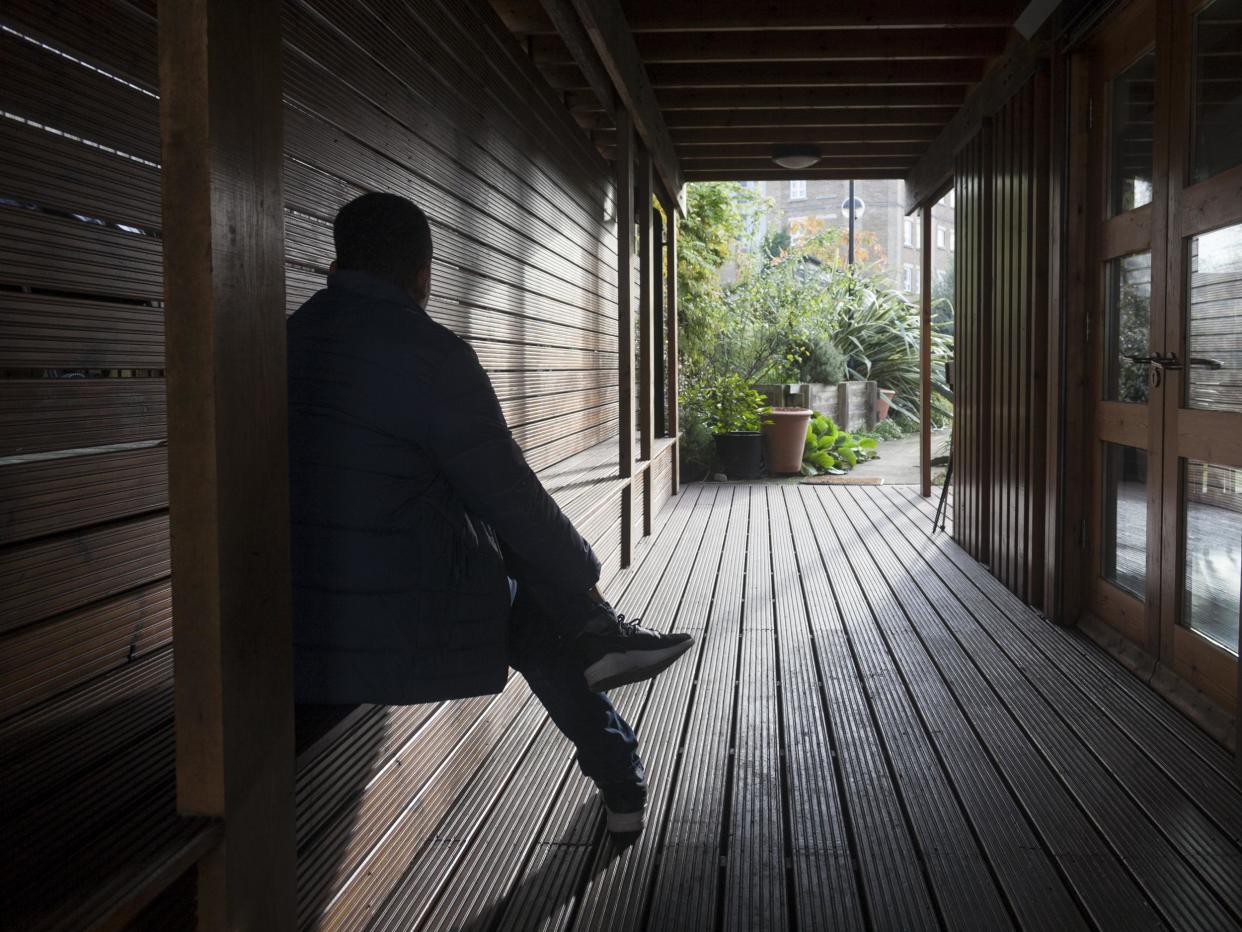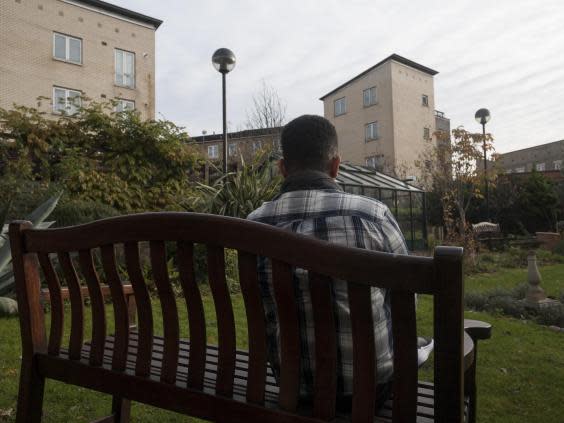‘Detention refreshes the memory – the trauma’: Torture victim unlawfully detained by Home Office speaks out

“The sound of the keys, it reminded me directly of Sudan. It took me straight back there,” says Abdul, describing his time in UK detention. “In Sudan they detained me, they tortured me many times. When I came here, they locked us in. There is no torture here, but the situation is all similar: officers, locked doors. It scared me. I didn’t sleep for days.”
The Sudanese national, whose name has been changed to protect his identity, fled from his country in 2005. He crossed the border illegally after escaping from prison, where he had been tortured for the previous two and a half months by government forces for being a member of the opposition party. When he wound up in the UK eight years later, believing he was finally in a place of safety, he was immediately detained and made to mentally relive the trauma of what he had escaped.
“I felt it was the end of the line here. Life had stopped,” he adds, visibly perturbed by the memory. He speaks good English in a tone so soft that you would think his life had been void of violence and suffering. But as he recounts the last 15 years of his life, it becomes clear that the opposite is true.
Abdul, who is in his late thirties, is one of hundreds and potentially thousands of asylum seekers who have been unlawfully detained in Britain under the Dublin regulations – an EU law which states that people seeking refuge in Europe must claim asylum in the first safe country they arrive in. A Supreme Court judgment last month confirmed that anybody detained under regulations from January 2014, when it came into force, until March 2017, when new regulations were belatedly adopted, was detained in breach of the law.
After leaving Sudan, Abdul crossed to Libya, where he found a place to stay and a job working in manual labour. The situation was far from perfect, and he was permanently split from his family, but at least he knew he was safe outside the jurisdiction of his country. After around two years, though, Abdul explains that a deal was struck between the Libyan and Sudanese leaders for former prisoners to be returned to Sudan. He knew at this point that he had to leave Libya – and the only way was across the Mediterranean Sea.

“It was dangerous. You just see sky and water, and you don’t know whether you will survive or not,” says Abdul, shaking his head at the memory of sitting in a cramped boat with two dozen other migrants. “Many people died. We were there for more than three days. We ran out of food and water. Children died on that boat because they couldn’t eat anything. It is difficult to remember that. I try to ignore that history.”
He survived the journey, and after days out at sea the boat arrived on the coast of Italy. His fingerprints were taken immediately by the Italian authorities and he was taken to a refugee camp. With hindsight, knowing the implications the act of having his fingerprints recorded has since had for him, he describes it as being “like a virus”, adding: “If you go anywhere, they will find it, and they will send you back. That is what happened to me.”
After six months in the camp the Sudanese national was granted asylum in Italy, but it quickly became clear that having a legal right to stay in the country was of limited benefit when neither state support or employment were available to him. Abdul was safe from the political persecution he endured in Sudan, but now found himself spiralling into a life of homelessness and depression, which brought with it its own dangers.
“I was homeless for nearly a year. I was sleeping on the street. Anything could happen. I was attacked on my right leg with a knife,” says Abdul, revealing a large scar on his shin. “I woke up and I was being attacked. I had to go to hospital. I could be killed at any point […] When I escaped from Sudan, all I wanted was a safe place. But in Italy, it was not safe. I had to leave. I couldn’t find a job because I couldn’t speak Italian. I had nothing there. I couldn’t focus. I became stressed and depressed.”
On resigning to the fact that he would not be able to restart his life in Italy, Abdul managed to jump into the back of a France-bound lorry, where he found himself in a small town with a large homeless population. On the belief that he would struggle to find help there, he travelled to Calais, where he had a friend who was trying to reach the UK. Abdul had never thought to go to Britain, but after several days sleeping rough on the outskirts of the town, he was successful in an attempt to board a lorry and cross to Britain illegally.
“I got out of the lorry not far from south London. There were three or four of us, everyone went different ways,” recounts Abdul. “It was very early. I had no food, no money, nothing. I hardly spoke any English – I just asked for the police. No one spoke to me but eventually I found someone who spoke Arabic. He said it would be best to go to the Home Office. He showed me the way – gave me a bus ticket and told me how many stops.
“I got to the Home Office and they gave me a screen interview, they took my fingerprints, and they found out I had fingerprints in Italy. They detained me the same day. They put me in the van, two officers sat right and left of me.”
Abdul’s voice wavers as he remembers that afternoon: “I never did any crime, even back home. It’s just because I came here without documents, I crossed here illegally because I was scared, from Italy, Libya and Sudan. It was not safe for me.”
He was taken to a removal centre and attempted suicide on his first night there. Despite this, he remained locked up there for a month and a half. “I was stressed. I hardly slept and if I did I was shouting in my sleep. I felt it was the end of my life,” he remembers. “I came to the UK, there is nowhere else to go from here. Australia, Canada, America, there is no chance to go there. I felt like I couldn’t keep living. There was no reason, if all my life would be like that. I didn’t need anything, just a safe place.”
The Home Office issued Abdul with a flight ticket, which he initially feared was for removal to Sudan, but it transpired was for Italy. A solicitor intervened and he was released from detention. He claimed asylum and started to attempt to integrate himself into a life in Britain. He threw himself into learning English and volunteering in the community interpreting for other asylum seekers. At one point he was offered a scholarship to study computer science at Bristol University, but the institution had to withdraw the offer after the Home Office informed them that he could be returned to Italy.
In the years that followed, Abdul was re-detained by the Home Office – twice – before they had even considered his asylum claim, simply because his fingerprints had been recorded in Italy years before. Each time, he was fortunate enough to have a lawyer fighting his corner, and was released within two months. Nonetheless, each period in the detention had a painful and lasting effect.
“Detention refreshes the memory – it takes me back to Sudan, the torture. I still have flashbacks, I still remember, I can’t forget it. Anytime – night, daytime,” says Abdul. “In prison in Sudan…” he pauses and takes a deep breath, before letting out a melancholic sigh. “It’s very hard. Every two or three days you get tortured, beaten. They did a lot of things to me in Sudan. It’s very difficult to go deep into that. I don’t want to go into the details. They could have killed me. I have a lot of scars on my body.
“Even now when I see police I remember the Sudan police. I try not to look, and keep my focus in this country. Here the police treat you by law, but in Sudan you have no value. They can beat you, they can do anything to you.”
Abdul is now trying to forget the past. He suffers from PTSD and still struggles to sleep at night without waking up shaking. He is still, after years, waiting on an asylum decision, and has been moved between more than seven asylum homes since he was last in detention. But the Home Office has finally agreed to properly consider his case, so he is hopeful.
“When I get my papers – if I get them,” he quickly interjects, ”I will work so hard. I will study and work at the same time. I would like to have a family. I just need to live a normal life, like others. I need to be an educated person. To educate myself, to study, to have a job. I’m not lazy. I just want to have a life. I just want to be safe.”
Read more
Home Office asylum detentions ruled unlawful as appeal dismissed

 Yahoo News
Yahoo News 
